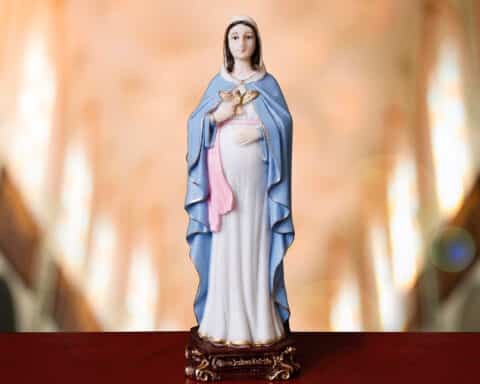“We wanted children out of love to really bring up and nourish and love and have,” Dan Niziolek told NPR in a recent interview. “The entire way it was really all about that.”
Approximately one in five American couples struggle with infertility. Like these couples, Dan and Heidi found themselves facing difficult decisions, given their desire for children. And, like many other couples, they believed the only way to get what they desired — a child of their own to love — was through infertility treatments, such as in vitro fertilization (IVF), that violate the natural order upheld by the Church.
Dan and Heidi view the fertility treatments they received as gifts from God. Even their decision to have children, they said, was shaped by their Catholic values. “If this isn’t about love, if this is not about compassion and the commitment we’ve made and the joy we’ve had with our kids,” Dan said in his interview, “I don’t know what’s more of a miracle than that.”
Our hearts go out to Dan and Heidi and every couple facing a similar situation. Infertility is a tremendous cross to bear. It can be a challenge to a couple’s sense of God’s calling and his providence working in their life together.
Compassionate respect for life
Across the country, new ministries and movements have begun to support and accompany couples suffering from infertility or miscarriage. An annual Mass has begun in the Archdiocese of New York. Springs in the Desert (a 2021 OSV Challenge finalist) offers couples community and pastoral resources. Hannah’s Tears helps couples grieve by comforting the brokenhearted.
In addressing the pain and suffering associated with infertility, the Catholic Church supports affected couples with compassion. However, it recognizes that only solutions that respect the sanctity of life and the marital bond, such as natural family planning and adoption, can help couples draw closer to Christ and to each other. Natural Procreative (NaPro) Technology and other fertility treatments in keeping with Church teaching honor the dignity of human life and the sacredness of procreation, offering hope and fulfillment to couples without compromising moral principles.
As we accompany couples struggling with the pain of infertility, we must recognize the divine spark present in every human life from conception and rise above any notion of a child as a right rather than a gift, as a product to be engineered rather than a blessing to be received.
The Church’s teaching on the sanctity of life and the moral implications of IVF does not stem from a disregard for the suffering that many couples experience. Rather, it emerges from a profound respect for human life and the natural processes by which it is transmitted. The Catechism of the Catholic Church teaches that both “techniques that entail the dissociation of husband and wife, by the intrusion of a person other than the couple (donation of sperm or ovum, surrogate uterus),” and those involving only the couple (such as IVF using the husband’s sperm and the wife’s ovum), separate “the sexual act from the procreative act” (Nos. 2376-2377). This reflects the belief that the act of creating life is a reflection of God’s loving and creative nature, which is why it should never be detached from the marital union.
Pope Francis has often emphasized the sanctity of all human life and the importance of welcoming children as gifts from God. In his apostolic exhortation Amoris Laetitia (“The Joy of Love”), he cautions the Church: “Let us not fall into the sin of trying to replace the Creator. We are creatures, and not omnipotent. Creation is prior to us and must be received as a gift.” As scientific technologies continue to develop, circumventing God’s design with technological intervention will become easier and easier.
A theological question
As we accompany couples struggling with the pain of infertility, we must recognize the divine spark present in every human life from conception and rise above any notion of a child as a right rather than a gift, as a product to be engineered rather than a blessing to be received.
For many couples, then, the question of IVF is less a bioethical one than a theological one. How is God’s providence unfolding in my life? What do I make of the real suffering that burdens my heart? Why would God deny me something good that I long for?
Accepting God’s will often comes with suffering. But Jesus is not asking us as Christians to live suffering that he himself did not endure. This is the message of the cross. And in this Easter season, we remember that the way of the cross does not end at the tomb, but in Christ’s resurrection to new life.
Conversations around IVF in the Church must return to these fundamental questions and to the hope that lies at the center of our faith. God’s goodness, his providence and his mercy, will guide us through even the most intimate of struggles, such as infertility.





